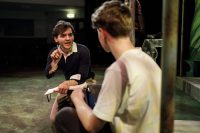Search the website

-
Award
Master of Arts, MA
-
Application process
Interview
-
Duration
One year (full-time)
-
Academic year
September 2026 – July 2027
-
Application deadline
Apply by 19 March 2026 (4pm – GMT)
Course overview
This vocational course nurtures your unique creative approach towards writing original drama for stage, radio and screen, alongside developing a systematic understanding of dramatic writing as art, craft and business.
The course is taught through masterclasses, workshops and seminars with experienced industry professionals, and cross-course collaborative projects with actors and directors to help support the development of your distinct writing voice.
You’ll graduate as an adaptable, imaginative and flexible drama writer with a broad portfolio of industry-ready work, offering professional skills for creating scripts in a variety of producing contexts.
Playwriting Development Programme - weekly short course for aspiring writers.
While you’re applying and waiting to start your one-year Postgraduate MA in Drama Writing, we thought you may find it interesting and useful to sign-up for our Playwriting development programme.
These weekly sessions run both in-person at Bristol Old Vic Theatre School and online.
A short taster video
Course highlights
🎭 1-to-1 feedback with industry dramaturgs, literary managers, producers and directors
🎭 Receive bespoke support and practitioner visits to develop your personal writing craft
🎭 Spend a year as a working writer, scripting multiple projects across a variety of media with different collaborative teams
🎭 Create a broadcast-quality 15-minute radio play in professional conditions
🎭 Find your future artistic partners with students from across creative disciplines at the School
🎭 Industry visits to regional and national producing venues, making professional connections now to build your professional network in the future
🎭 New Writing Festival – where your new full-length plays are presented as script-in-hand readings to an invited industry audience

Course structure
The course guides you through four distinct modules:
🎭 The Dramatic Medium 1 (Theatre) where you’ll build a writer’s toolkit, exploring and expanding upon core principles of drama writing by examining playwriting through history and responding with your own new scenes.
🎭 Dramatic Medium 2 (Recorded Media and Contemporary Developments in Creative Practice) where you’ll apply these skills to a short radio play, an original screen-based drama, and a writer-led project proposal based upon a research specialism of your choice
🎭 The Drama Writing Industry, which guides you through sessions with industry representatives from venues, companies, trade unions and producers towards a bespoke professional plan for your year after graduation
🎭 Writing a Signature Script, where you’ll work closely across all three terms with the MA Drama Directors, actors and visiting dramaturgs to write a new full-length drama, presented as a script-in-hand reading during our New Writing Festival

Launching your career
You’ll leave the course with a bespoke year-long plan for entering the drama writing industry, collaborators for future projects and an exciting and diverse portfolio including short and full-length scripts, a fully-produced radio play, treatments and scenes for film or TV and proposals for writer-led creative projects.
This course is delivered from a practitioner’s perspective and the hands-on experience will ensure an excellent start to your drama writing career, providing a practical and critical understanding of the business of freelancing, including:
🎭 learning strategies for self-promotion
🎭 knowing how to advocate for your professional practice
🎭 vital opportunities to build industry contacts with visiting professionals
🎭 up-to-date knowledge on script commissioning and adaptable skills for script development across different media
🎭 strategies for creative collaboration across a range of scriptwriting contexts.
Graduate successes include commissions and development roles in TV and audio drama (BBC Cardiff, Casualty, Crimewatch, Radio 4 Afternoon Play, Merman Productions, Channel 4 New Writers Scheme); new international productions (Bridge Theatre, Brussels; Chengdu-Chongqing International Theatre Festival) and UK productions (Hope Theatre, Jermyn Street Theatre, Tobacco Factory Theatres, Edinburgh Festival Fringe); independent film production (Indefinite Films, Gentlewoman Productions); writing for opera and musical theatre (Royal Academy of Music); artist development programmes at The Bank (Sheffield Theatres), Kali / Birmingham REP Discovery, Bristol Old Vic, Mercury Theatre Colchester and Puppet Place, and winners of the Phoebe Waller-Bridge Keep it Fringe Fund and Arts Council England funding.
-
Awarding Body
Bristol Old Vic Theatre School is an associate school of the University of the West of England (UWE Bristol), a Higher Education Provider registered with the Office for Students. On successful completion of this course, you will receive an award from UWE Bristol. Because of their vocational nature, BOVTS does not award degree classifications – all assessment is completed on a pass or fail basis.
-
Locations
This course is taught predominantly at the School’s main site at Downside Road. From time-to-time, rehearsals and teaching may take place in alternative spaces in close proximity to the School.
-
Teaching and Learning
The course is taught through practical skills-based writing workshops, visiting masterclasses, mini collaborative projects, script development sessions round-table and in studios with actors and directors. Students access one-to-one mentoring, peer support and sharing, and cross-course learning with other disciplines as relevant to the role of the working writer in the industry today.
Students learn through developing a growing portfolio of scripted work and writer-led projects both in practice and on the page to take into the professional world upon graduation. You’ll be exposed to a range of different practitioners and methodologies throughout the course and encouraged to apply these to your writing process.
Students will have numerous practical sessions with visiting dramaturgs, drama directors, commissioners, emerging writers, TV, audio and digital script creators, and sessions on career development with regional and national producers of new work. The small class size of eight enables detailed support from the Head of Course as your dramaturg and mentor for the whole year, supporting the development of your writing voice and creative identity.
The first term has a tightly-structured timetable taught by the Head of Course, BOVTS staff and a select number of visiting professionals, encouraging a high turnover of new ideas and scripts each week; the second term brings in specialists from audio and screen and invites writers to develop longer-term projects at different speeds for different media, including bespoke sessions relevant to their personal practice; the third term engages with industry leaders, venues, literary managers and producers to expand professional awareness and refine the politics of your practice, alongside completing an industry-ready draft of a new full-length script.
The course requires full-time hours to complete and is structured around 16-17 contact hours per week across 2.5 days including 1-to-1 tutorials, taught sessions and student-led workshops, with the remainder of full-time hours spent working independently on self-directed writing, research and reading. Considerable work outside of your contact hours is expected. The course will also include some extra-curricular projects.
Most contact time is live but some sessions with remote (national / international) practitioners are delivered online. The majority of practical sessions will be in-person at the school and its associated teaching sites. Throughout the duration of the course you will continue to have tutorials with the Head of Writing to consolidate your learning and to review professional practice.
-
Assessment
The MA in Drama Writing is an unclassified Master’s of Arts degree. This means that on completion of your course you will receive a degree but without a classification (i.e. without distinction, merit or pass).
Detailed feedback at BOVTS is continuous throughout each term as you progress the development of your various scripts and projects, sharing them with core staff, students and visitors. Your final assignments for all modules will be marked on a pass or fail basis.
All timetabled classes are compulsory and staff will monitor your progress closely, providing you with regular feedback to help you develop. This includes both verbally in class and in individual tutorials, as well as written feedback at the end of each module assessment. You will also receive feedback from a variety of different staff – for example visiting industry professionals invited to your project presentations or those working with you on script development.
On each module you will be assessed against relevant industry standards, the extent to which you have met the module learning outcomes, and your ability to bring together all aspects of your learning. Whilst there are no written exams, as part of some assessment processes you will complete self-reflective writing, analysing the development of your writing practice across the year, with specific submissions for Dramatic Medium Part 1 and Writing a Signature Script.
-
Module Map
Each module is worth a specified number of credit points. All modules are compulsory, enabling you to cover key subject knowledge while developing your own interests.
🎭 The Dramatic Medium: Part 1 (Theatre) (45 credit points)
The aims of this module are to equip students with the core competencies of the writer’s craft, give them opportunities to consider the application of these competencies across different historical and cultural contexts, and to practice their application through a series of scene-writing exercises, research tasks and collaborative explorations. These activities will contribute to a final portfolio of scenes and a short piece of self-reflective writing.
🎭 The Dramatic Medium: Part 2 (Writing for Recorded Media and Contemporary Developments in Creative Practice) (45 credit points)
The aims of this module are to extend the students’ knowledge of core competencies, applying them at a professional level to explore the unique artistic opportunities available when storytelling through audio, screen and non-traditional practice (e.g. scripting for pervasive media, site-specific performance, writing for children, verbatim theatre). Students write and produce a short audio play, create original material for screen, work collaboratively with other relevant courses and propose a writer-led project informed by research into non-traditional practice.
🎭 Writing a Signature Script (60 credit points)
The aims of this module are to engage students in a sustained and gradual process of script development across three terms, to work professionally with feedback from a variety of inputs (collaborative studio work, round-table readings, peer dramaturgical support, external practitioner input, script-in-hand reading of submission draft), to encourage dramaturgical choices that express each writer’s unique creative identity, and to synthesise their learning from across the MA course. Writers will create a short presentation on early ideas in Term 1, longer excerpts and full drafts in Term 2, and redrafts in Term 3, alongside a reflective presentation and essay on the development process.
🎭 The Drama Writing Industry (30 credit points)
This module will equip students with a deep and systematic understanding of the drama writing industry, of the key skills and behaviours essential to creating a successful drama writing career, and most importantly, how they view themselves and the role of the writer within it: now, and in the future. The module will engage with visiting speakers who develop, commission and produce writers, but also focus on the idea of writers as change-makers, setting the agenda to shape their own careers and the industry around them. Each student will write a Personal Development Plan outlining their plans post-graduation.
-
Entry requirements
Applicants will normally be expected to have an honours degree in a related subject area, and it is expected that all candidates will demonstrate some experience of dramatic writing. An example of drama writing (25 minutes of continuous script for the stage, either as a self-contained short play or excerpt from a longer play) will be required as part of the selection process.
Applicants should have a clear understanding of theatre and their individual creative ambitions. They should also demonstrate some knowledge of and / or practical engagement with the drama industries (stage, audio, screen) e.g. through extra-curricular work, non-degree training, workshops and talent development groups, self-producing, regular attendance / viewing of new work, engagement with industry news or undertaking professional non-writing industry roles.
For speakers of English as a second language an IELTS 7.0 (International English Language Testing System) is the minimum requirement with a minimum of 7.0 in each component of reading, writing, listening and speaking.
-
Selection process
Entry to the MA Drama Writing course is through submission of a 25-minute script for stage and an application statement.
We initially assess your suitability to proceed to an interview based on the information you provide on the application form and the script submission.
When selecting candidates for interview we look at:
🎭 Your control of writing craft in the submitted script
🎭 Your level of practical experience across stage and other media
🎭 Your level of industry knowledge and understanding
🎭 Your suitability and potential for training on the course pathway
Interviews for this course are in-person but it is possible to hold online interviews if preferred. You will be interviewed by a two-person panel, one of whom will be the Head of Course, and you will also have the opportunity to ask questions about the programme. There is no application fee for this course.
The selection process will seek candidates whose writing and creative approach indicates the best chance of building a freelance career in the professional industry after training.
-
Tuition fees 2026 entry
🎭 Domestic: £16,500
🎭 International: £27,010
We regret that we are unable to consider applications from students requiring a visa to study in the UK during the 2026–27 academic year. For further information, please see the dropdown “Students requiring a visa to study in the UK.”
Accommodation and living costs are not included in your tuition fees.
Further information about financial support from the government, and bursaries and scholarships that you may be eligible to apply for is available from our fees and funding page.
-
Additional costs not included in your tuition fee
There are some additional costs associated with this course that are not covered by your tuition fee. Costs given in brackets are to help with budgeting and are indicative only. These are likely to include:
🎭 recommended texts – before buying your own copy, you may wish to see if you can borrow through the UWE library or other loan schemes.
🎭 IT equipment – it is recommended that you have your own laptop or computer.
🎭 tickets to see performances as part of the course (£150)
🎭 stationery costs (£25)
A detailed equipment list will be sent to new students ahead of beginning their training. If you are facing financial hardship, then the School may be able to loan you equipment or help you meet these costs with a bursary. New students should contact admissions for further advice.
-
Students requiring a visa to study in the UK
Due to a recent change in the Theatre School’s governance, our Higher Education provider UWE Bristol is unable to issue Confirmation of Acceptance for Studies (CAS) documentation for BOVTS courses. Regrettably we are therefore unable to consider applications from students requiring a visa to study in the UK for 2025 entry.
The Theatre School is able to consider applications from international students who do not require a visa to study in the UK. If you are unsure of your tuition fee status, please consult the UK Council for International Student Affairs guidelines or contact our admissions office for further guidance. Prospective international students for future years of entry are encouraged to join our mailing list to learn more about training at Bristol Old Vic Theatre School.
In the meantime, there are several ways that prospective international students can undertake training with BOVTS:
– We run a series of online masterclasses throughout the year, which are accessible wherever you are in the world. Find out more about what’s coming up on our short courses webpages.
– We offer intensive, in-person short courses for adults throughout the year in acting, creative and production disciplines. These currently range from day-long masterclasses to a ten-week acting foundation course. International students for these courses can normally visit the UK on a standard (holiday) visa, where required. Find out more about what’s coming up on our short courses webpage.
– We run acting international masterclasses in selected destinations throughout the year. Sign up to our prospective student mailing list or follow us on social media to be the first to know when new dates are set.
- Policies and Procedures


